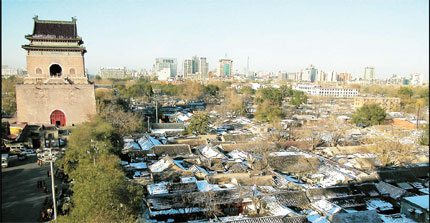Trying to save the old Beijing
The hutong (alleyway) courtyard house of Liang Sicheng, the "father of modern Chinese architecture," stands half-demolished, a sad testament to the visionary planner who tried in vain to save the old city of Beijing, its walls and gates from destruction.
|
The desolated siheyuan houses near the Bell Tower in Beijing. |
Over the Spring Festival I surveyed the roofless rooms and piles of tile and debris and was joined by Wang who described his battles - and those of Liang before him.
Liang (1901-1972), who studied architecture at the University of Pennsylvania and returned to China in 1928, rented the house in Beizongbu Hutong from 1931 to 1937 with his wife, architect Lin Huiyin.
The house was a renowned salon for Beijing-based intellectuals including American scholar John King Fairbank and Chinese writers Xiao Qian and Shen Congwen.
"Since the Liang family had children and an old parent, their friends actually gathered at the house of philosopher Jin Yuelin just next door," says Wang. "Jin was also an admirer of the pretty, talented Lin. He never married and always lived next door to the Liang couple. Jin hired a Hunan chef, which added flavor to the cultural parties."
Facing roofless rooms and broken tiles in front of Liang's and Jin's homes in hutong this Spring Festival, Wang shared with me the beginning of his career and his battles to save these architectural gems in the 7,000-year-old city.
The author of two best-selling books on China's urban history released the English-language edition of his famous "Beijing Record" in January.
Born in 1969 in mountainous Guizhou Province, Wang's first assigned beat was "unpopular" city planning and development after he graduated with a journalism degree from Beijing's Renmin University in 1991.
But Liang Congjie, the master architect's son, opened a door. "I was a green reporter but he spent three afternoons over three weeks telling me stories of his legendary parents," recalls Wang. "I was enamored of their life stories, as well as the colorful urban history of Beijing. From then on I decided to dig deep in this field."
Wang's journalistic career in developing this "unpopular" beat coincided with Beijing's massive urban development in the 1990s. At that time, part of the old city had to make way for real estate projects. Since then, Wang has become an outspoken advocate of saving the city's architectural legacy, a folk hero helping locals whose houses were threatened with demolition and who were forced to relocate to make way for developers.
Established in the 13th century, Beijing was described by Marco Polo as "the most magnificent city on Earth." Over the centuries, the city expanded while enduring conflicts and occupations as dynasties rose and fell.
"Beijing's peaceful liberation in 1949 saved the city, but ironically a systematic destruction soon began," says Wang.
City planners rejected a famous proposal by Liang and his colleague Chen Zhanxiang (whose Shanghai connections were introduced in Shanghai Daily on September 15, 29 and October 13, 2010) to preserve the ancient city and relocate a new administrative center to the western suburbs.
"Instead, the government approved a blueprint by Russian experts that favored massive destruction and reconstruction," he says. "So over the last half century, as the capital's population and traffic have exploded, much of the old city has been leveled to build housing and roadways."
 0
0 







